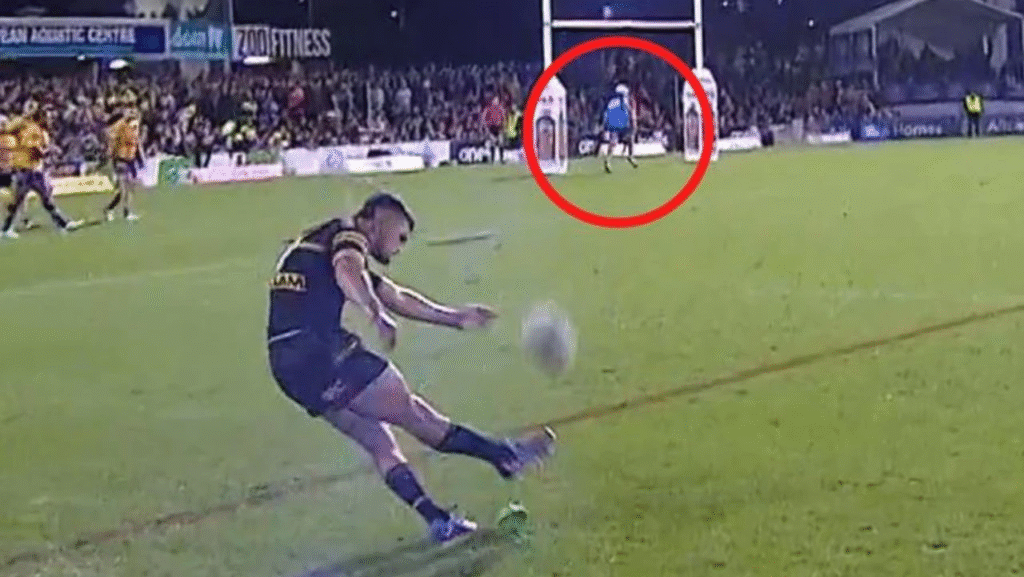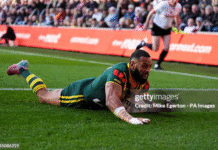The Penrith Panthers have found themselves at the centre of another avoidable controversy, this time with a club trainer copping a five-game suspension and the team slugged $50,000 for interfering with Jayden Campbell’s sideline conversion attempt last Saturday. The outrage from fans and media alike has been loud — and rightly so. But beneath the anger lies a deeper question: why didn’t the NRL fix this problem when it first reared its head in 2022?
Let’s rewind to May of that year. The Panthers were locked in a tense local derby against arch-rivals Parramatta. In the second half of the game, Nathan Cleary lined up a crucial sideline conversion attempt. Just as he began his run-up, a trainer entered the in-goal area, causing a noticeable distraction. Cleary missed. The Eels held on to win by two. It was a moment that should have prompted immediate change.

NRL Head of Football Graham Annesley acknowledged the problem back then, admitting the game’s laws were ill-equipped to handle such incidents. He even went as far as to say the NRL would consider amendments to allow a re-kick if a trainer illegally interfered.
That was over three years ago.
Fast forward to Round 22, 2025. Jayden Campbell is in almost the exact same position — a clutch sideline kick, and a trainer from the opposing team moving around in the background. He misses. There’s no option for a retake. The Titans fall agonisingly short in golden point, despite a remarkable comeback from 24-0 down.
This isn’t just a Panthers problem. Yes, the club should absolutely be held accountable. Their trainer’s actions were outside the spirit of the game and rightly punished. But this is also a governance failure. The NRL had a clear warning sign in 2022 and did nothing. Instead of acting decisively to close a loophole that could — and did — impact results, the game’s decision-makers chose inertia.
The argument that this sort of thing only happens “once in a blue moon” doesn’t cut it. Once is enough when competition points and reputations are on the line. If the laws of the game can be exploited or left vulnerable in high-pressure moments, then the NRL has a responsibility to act — not just comment after the fact.
Saturday’s game was thrilling, chaotic, and riddled with officiating controversy. There were bizarre calls in the lead-up to Nathan Cleary’s booming 2-point field goal, overshadowing the final play that led to Blaize Talangi’s golden try, and a bunker performance that left Titans fans and commentators scratching their heads. The trainer incident was simply the cherry on top of a baffling afternoon for officials.
But out of controversy comes opportunity. This incident — and the firestorm it’s sparked — must serve as the catalyst for long-overdue reform. If the NRL is serious about protecting the integrity of the game, it needs to:
- Amend the rules to allow for a conversion retake if a non-player — like a trainer — unlawfully interferes with the kicker.
- Clarify the role and movement of trainers during live-play situations, particularly around kicks at goal.
- Review officiating standards, particularly the bunker’s role in game-shaping decisions such as the Brian To’o incident which could have led to a penalty try.
There’s also a broader conversation to be had about consistency. Had this interference occurred in a finals match or Origin, the outcry would be tenfold. Every game matters, and every player deserves the same level of protection from outside influence — whether it’s Round 22 or a Grand Final.
The Panthers have released a statement saying it was an honest mistake but that does not excuse the outcome, but the real responsibility lies with the rulemakers. Their lack of foresight in 2022 has contributed to this week’s mess. Let’s hope this incident isn’t just another headline that fades — but a trigger for real, meaningful change to protect the game’s credibility.
Because next time, it might not just be two points lost.
It could be a season.
Should the NRL action the change they proposed in 2022? Comment below.














